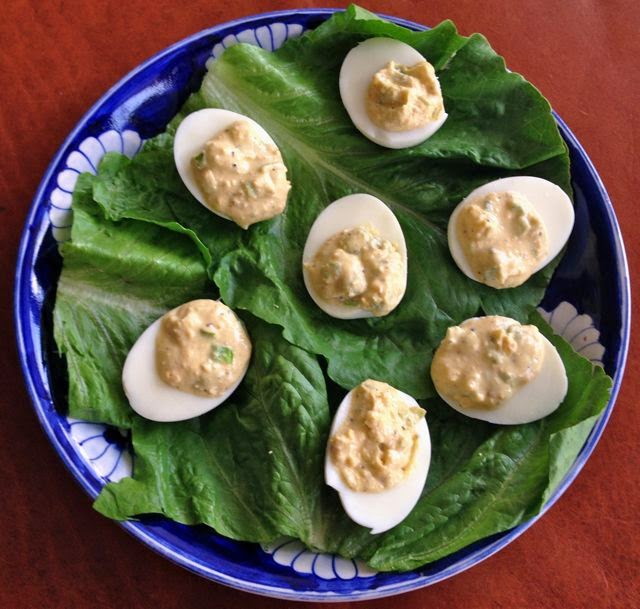I can’t remember the first time I consumed a devilled egg. In
fact, it has never even occurred to me to query where they came from.
That is, until recently, when one of our Iranian dinner
guests – about to pop an entire devilled egg into his mouth – proclaimed
gleefully, “Oh, these are very British,
aren’t they?”
At the time, I begged to differ as I have been offered
stuffed eggs in Iranian homes on a number of occasions. This little savoury
treat, usually filled with a mixture of mustard, mayonnaise, pepper sauce,
pepper and salt has long been a favourite in our home. I have been serving them
up at dinner parties for many years in different countries.
 |
| Devilled Eggs with a Middle Eastern Flavour |
But the question did haunt me. I had to ask myself where the
devil did they come from?
After some scratching around in the historical henhouse, I
discovered that devilled eggs go a very long way back. Baskets of boiled eggs
can be seen in hieroglyphic drawings inside ancient Egyptian tombs. The
Byzantine physician, Anthimus, wrote in his de
observatione ciborum (On the Observance of Food) that boiled eggs are excellent
for good health and recommended we eat lots of them.
It was, however, the ancient Romans – seemingly the first
people to domesticate birds for their eggs – who concocted the idea of the
stuffed egg. Or at least, they were the
first to record it in a recipe. Apicius, a Roman food writer from the late 4th
century A.D. wrote the instructions for stuffed eggs in his book e re coquinaria (On the Subject of
Cooking).
Apicius was the master chef of his day and On the Subject of Cooking appears to
have been the go-to text in any Roman
kitchen worth its salt. Contained in its pages is the trendy dish of boiled
eggs, sliced in half and stuffed with a variety of ingredients and covered in a
spicy sauce. They were served as appetisers to guests, reclining in togas on
couches and drinking jars of wine.
Given that the Romans invited themselves into a large number
of countries during their grand imperial tour, it would be safe to surmise that
they also brought the stuffed egg with them to their new homes. Although
stuffing the eggs with roasted flamingo probably no longer cuts the mustard in
a modern kitchen, the devilled egg has remained on the menu ever since.
But where does the “devilled” aspect come from? Well, this
is where the British influence does play a part. Apparently, in the 18th
century, English cooks spiced up their meat, particularly offal, by cooking it
with cayenne pepper and spices. The association of Hell being a reputedly hot
place ignited the notion of spicy food being cooked by the Devil! The concept
of adding some satanic spices to
other food led us eventually to the devilled egg.
I recently read that devilled eggs
were also a Middle Eastern delicacy, served to honoured guests in many
locations along the ancient Silk Road. I leave you with an exquisite recipe
from this part of the world.
Devilled Eggs with a
Middle Eastern Flavour
8 eggs, hard-boiled for about 10 minutes and left to cool
2 to 3 tablespoons of chopped spring onions
4 tablespoons of plain yogurt
3 tablespoons of extra virgin olive oil
2 tablespoons of lemon juice (preferably fresh)
1 heaped teaspoon of Dijon mustard
Salt and freshly ground black pepper to taste
What to do:
Peel the eggs and cut them in half carefully. Scoop out the
yolks into a bowl and set the egg whites aside.
Mash the egg yolks well and add all the other ingredients.
Stuff the egg whites with the mixture.
Chill in the fridge for at least an hour before serving.
Serve on a bed of lettuce.
Spinach option: if spinach is your thing, you can add about
250 grams of cooked and shredded spinach to the yolk mixture.
No comments:
Post a Comment